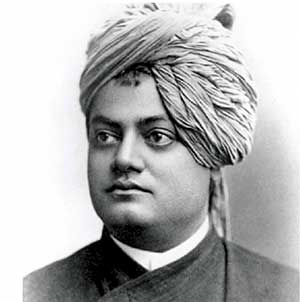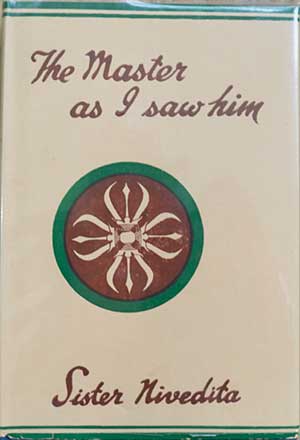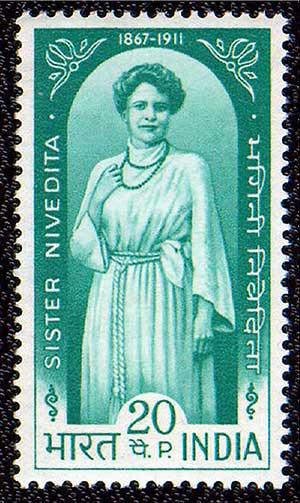Sister Nivedita—a psychological reassessment
Published in 20th Century Social Perspectives, Features, Issue 1 (January/February 2018), Volume 26Revered as a saint in India, more effort has gone into honouring her memory than understanding her.
By Malachi O’Doherty
Margaret Noble, or Sister Nivedita, was a far more complex and interesting person, judging by her letters, than most research on her suggests. She is widely regarded as a saintly woman. She had followed the mystic Swami Vivekananda to India in 1895, had been adopted by him as a disciple and was dedicated by him to the education of Indian women. Born in Dungannon, she features little in Irish history because her main work was in India.

Above: The Letters of Sister Nivedita, edited by Sankari Prasad Basu (Nababharat Publishers, Calcutta, 1982)—probably the best insight into her personality.
Letters
She directed much of her energy into the cause of Indian nationalism. By some accounts she was an active revolutionary, by others an encouraging bystander. The best access to her personality is probably her collected letters, edited by Sankari Parasad Basu, though she presented herself differently to different people. She left politics entirely out of her correspondence with some friends, while saying little about her religious beliefs to others.
She had a substantial intellect and an impressive personality for someone whose formal education ended at sixteen. Her friends, aside from Indian spiritual luminaries like Vivekananda and Aurobindo, included William James, Rabindranath Tagore and Prince Kropotkin—some of the best minds of her time. Nivedita wrote thousands of letters and at times expressed anxiety about her own mood swings and difficulties in her friendships with men. She was candid about the emotional turmoil awakened in her by Vivekananda and repeated several times that their connection was ‘personal’. She had needed more personal intimacy from him than he had been able to give, and he at times pushed her away.
Some suggest that the tension was sexual but Nivedita says that she needed him to be a father to her, to give her something that she had not had since the age of nine, when her own father died. Both Nivedita and Vivekananda must have noticed the pun in the name he had given her. His name before his vows was Narendranath Dutta. Nivedita is pronounced (roughly) na-vay-dutta (not deeta). And Vivekananda often spoke of his western followers as his mother, sister or daughter. It seems unlikely that she would have been as candid about her need for Vivekananda’s love if it was sexual, but it is hard to read the mind of a Victorian Englishwoman from this distance in time and to be clear how much she would have understood of her own feelings. This was before Freud told us that everything is rooted in the libido.
Josephine MacLeod
There is more evidence of physical intimacy in her letters to Josephine MacLeod: ‘My beloved Joy I cannot imagine myself existing without my weekly letters to you … I often kiss your photograph Dear. Alas that the original is no longer there to be kissed, and worship it with flowers.’ She ends that letter with an assurance that Josephine need not be jealous: ‘Let me say for your consolation that no sensation on the part of the “other maiden lady” will have a chance against yours.’ Were they sexually intimate? When they stayed on houseboats in Kashmir they slept on different boats. But other letters from Nivedita refer to their ‘sweet kisses’. Nivedita pledged herself to celibacy, so any sexual relationship with Vivekananda would have made that untenable, but she may have felt that kissing Josephine was admissible within the terms of her vow in a way that sleeping with Vivekananda would not have been. And were she being a hypocrite in seeking a physical relationship with him while taking her vow she would hardly have written so candidly about her need for him.
Samuel Kerkham Ratcliffe
Similar questions arise from the most remarkable of her letters, addressed to the journalist Samuel Kerkham Ratcliffe, for whom she sought to be a guide and confidante. She met Ratcliffe in Calcutta when he was editor of The Statesman; she befriended him and later his wife, and became the godmother of their children.
Her first known letter to Ratcliffe was written on 25 September 1902, though it refers to previous correspondence. He has given her some news and expects her to find it difficult to accept. She answers, ‘When you say, “God help me, I can do no other”, what can I do but give my reverent sympathy and full concurrence. … What we seem to have gained is that you have definitely and solidly made up your mind on your own account. This will give you happiness, perhaps the more for the pain through which it has come.’ And she assures him that ‘I must have expressed myself very badly indeed, if I have made it appear that humble and patient living of your lives and learning of your lessons would be to me as treachery or hindrance’. Presumably ‘treachery’ and ‘hindrance’ are words that he has used.

Above: Swami Vivekananda—Noble had followed him to India in 1895, had been adopted by him as a disciple and was dedicated by him to the education of Indian women.
Her next letter to him, in December 1902, probably clarifies the question over which he had feared they would quarrel. ‘It is a startling thought that in another day or two you are to be married.’ But she assures him again of her support. ‘It is delightful to think, as I do not fail to do often, of how happy you are. I can not tell you of the blessedness that I desire for you.’ Their correspondence continued through the marriage and she was a close friend and supporter. Fifteen months into his marriage, Ratcliffe is writing to her again and she replies: ‘You spoke of your need for sympathy from me. Please feel that you have it entirely … Remember that the more you will let me give you, the more grateful I shall be.’ She urges him to follow his heart and ends by letting him know where they might meet: ‘I am to speak at the town hall on Friday’. Ratcliffe’s wife, Katie, knew how important her husband’s friendship with Nivedita was to him and wrote to her. Nivedita’s reply, part of which has been excised, addresses the idea, raised by Katie, that a man should have as much freedom after his marriage as before to form friendships with women. Nivedita replied: ‘The Beloved should not be “as free as before”. He should feel that till love was, he knew no freedom. Unless infinitely more free, because infinitely more strong, the whole thing is a mistake.’
Nivedita would remain friends with the Ratcliffes until the end of her life. Their first child Francis, later an eminent scientist, was born that same year. Nivedita was the godmother and the child was given her surname, Noble, as a middle name. Two days after her letter to Ratcliffe, urging him to follow his heart, she wrote to Josephine MacLeod about her spiritual journey and her continued adherence to her vow of celibacy. She argued that there was a moral difference between giving and taking sexual pleasure in another. ‘Only Jesus could understand Mary Magdalene. Remember that. He alone. There was no other great enough for that.’
Walt Whitman’s poetry

Above: The Master as I saw him: being pages of the life of the Swami Vivekananda, simultaneously published in England and India in 1910.
Of her own vow of brahmacharya, celibacy, she wrote in September 1902: ‘And of course, in the great way, of taking no one close, of thinking no thought and speaking no word of human intimacy and affection, it has not been kept—and it is for Him [Vivekananda] to say, some day, that I did His work in that also. But I know now that He will. I know now that I have done right—and all is well.’
There were few letters to Ratcliffe in the early years of their friendship because she was meeting him routinely. He had already published a little book on Walt Whitman, and she had a love of Whitman’s poetry that she may have acquired from him. One of his letters to her in August 1905 illustrates the warmth of their relationship.
‘You are what I knew you to be—and I am glad and grateful. I am doing night duty this week, and I don’t think it will be possible to come over in the morning. If I am not too tired I will start off about 7; then perhaps I can have about an hour with you.’
That intimacy wanes in the later letters, when they are further apart. A year later Nivedita wrote to the Ratcliffes when they were returning to India after a time in England: ‘… only remember that you come back to a world of love and gratitude and approval that feels itself to be only a part of what you both deserve’. She asks them to read part of Whitman’s Song of the Open Road. This included the lines that astutely anticipated that Ratcliffe would not be able to stay in India. He would lose his job for supporting Indian nationalism and would have to return to England for work:
You but arrive at the city to which you were destin’d, you hardly settle yourself to satisfaction before you are call’d by an irresistible call to depart.
Another line was:
What beckonings of love you receive you shall only answer with passionate kisses of parting.
Nivedita had already used this verse in a little book on Kali worship.
Christian Science
Nivedita, though highly religious, often doubted that she was on the road to sanctity or that she was really true to the life that Vivekananda had urged on her. This wasn’t just the ‘dark night’ of the troubled mystic; it was a realisation that she was devoting herself more to journalism and activism than to a spiritual journey or sadhana.
Her personal theology was mostly spiritualism and Christian Science, not Vedanta. Vivekananda had not tried to discourage her Christian Science beliefs, for he taught that all spiritual roads eventually led to the same enlightenment. She did not practice meditation intently, though she speculated that she might have a chance to if she was imprisoned. She made no claim to mystical experience and even bemoaned the fact that others had received messages from Vivekananda from ‘behind the veil’ while she had not. It must have come as a shock to her that Vivekananda appeared to her friend the revolutionary Aurobindo in his prison cell, though later, in a letter to Ratcliffe (21 July 1909), she scoffed at Aurobindo’s belief that his mission from God would be protected:
‘But he believes himself divinely impelled and therefore not to be arrested … but certainly GOD gives no promises of indemnity! Joan of Arc is a perpetual witness to the contrary. It is when we have suffered all, that we sometimes say, “Yes, my voices were of GOD”.’
Nivedita travelled to Europe and the US three times during her spell in India; she met Ratcliffe again in England and maintained a correspondence with him to the end of her life. She was now writing like one journalist to another, with much of the wit and dark humour characteristic of that profession. These letters are different in tone from those to her other correspondents. They are politically astute and their humour is often black and caustic. Ratcliffe is the only one with whom she shares her insights into revolutionary activity in Bengal, and she rarely mentions to others her fears that she was being spied on by the police and might be in some danger. Indeed, she rebuked Josephine MacLeod for suggesting that she was politically active and denying it emphatically; at the same time she was writing candidly to Ratcliffe, expressing her contempt for an Indian nationalist based in Paris: ‘It would be impossible to tell you the pleasure I should feel on hearing that Krishnavarma Shyamji had been finally strangled’.

Above: Rabindranath Tagore, one of Noble’s notable friends.
Anti-suffragette and anti-Semitic
She shared with Ratcliffe in 1909 her disdain for hunger-striking English suffragettes:
‘The women who need force feeding represent a type (they do not all belong to it—of course) that is reckless and unscrupulous and makes a hell of the serenest noblest home. My principles might make me condone their agitation—but Oh my instincts would commend a thrashing.’
She urged Josephine MacLeod not to ‘be killed, working for Women’s Suffrage!’ Only Ratcliffe hears her contempt for Jews: ‘I am afraid I am not quite sound on Dreyfus. I can see too clearly the position of France!’ She wrote: ‘A very few of that race may have done something for art museums—universities—but for the most part they are worshippers of the flesh’. Nivedita’s nationalism was based on a belief in racial characteristics. She believed that India had a native religious genius that justified its claim to be an independent nation. She explained to Ratcliffe that she did not believe that India would become a theocracy but that nationalism would wash away much that was divisive in Hinduism. On 18 August 1910 she wrote to him: ‘The National movement is precisely national and not pro-theocratic at all. The word was designed to cover this very thing—of course among others. It is a flood that is to obliterate caste, without opposing it, and carry all wreckage together to a new tide-line, where old debris shall make new foundations.’
The end

Above: The Indian stamp issued in 1967 to commemorate the centenary of the birth of Janet Noble, a.k.a. Sister Nivedita.
Her own work was mostly writing and teaching. Apart from her own books, she edited the works of Vivekananda and worked alongside the biologist Jagdish Chandra Bose to help him write his books proving consciousness in plants, and she gathered news stories for Ratcliffe, not just suggesting angles to him but directing him to American magazines and making introductions to help his career. She edited Aurobindo’s journal Karma Yogin for a time in 1910, probably to cover for the fact that he was fleeing British India. She had more books in mind to write but several times told her friends in letters that she did not expect to live beyond 1912—and she didn’t; she died in October 1911. In her final days she was diagnosed with ‘blood dysentery’. It seems reasonable to suppose that she had known for years that she suffered a serious condition. She was outlived by decades by MacLeod, Ratcliffe, Aurobindo and other friends. Contemporary writing in India is still effusive and reverential in tribute to her. If Irish history is to make a place for her, it will have to understand her more comprehensively than her devotees have done.
Malachi O’Doherty is a journalist and broadcaster.
FURTHER READING
S.P. Basu (ed.), Letters of Sister Nivedita (Calcutta, 1982).
M. Hayes, ‘Dedicated to Indian nationalism’, History Ireland 18 (4) (2010), 66.
















